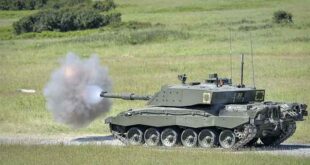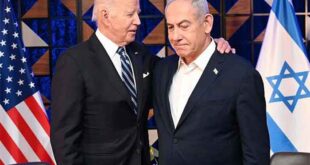
A bipartisan report Tuesday urged the Trump administration to halt a planned troop drawdown from Syria and to step up diplomatic efforts to counter Iran’s influence and stave off a resurgence of the Islamic State militant group.
The 12-member Syria Study Group appointed by Congress warned that the Syrian conflict was far from over, that ISIS was still a threat and that without a determined U.S. response — backed up by troops on the ground — ISIS and other terror groups could flourish and Iran and Russia could expand their reach.
“The United States cannot avoid or ignore the conflict in Syria,” the report said.
“While some argue that it is too late for a reinvigorated U.S. approach to Syria, we conclude that the United States can still influence the outcome of the Syrian war in a manner that protects U.S. interests,” it said.
But President Donald Trump has sent mixed messages about the future U.S. military presence in Syria and the report said that the Trump administration’s flip-flops had sown doubts among allies about America’s reliability.
“Sharp shifts and reversals in American policy, and the failure of senior U.S. government officials to prioritize the issue with their counterparts, have undermined American credibility and the effectiveness of U.S. policy,” the report said.
The White House declined to comment on the report.
The report’s thinly veiled criticism of Trump’s handling of Syria, and its assertion that the administration needed to devote more resources and attention to the issue, carried added weight as the group included staunch Republicans such as former GOP senator Mark Kirk of Illinois.
The Syria Study Group’s findings were unanimous, the report said. The group included retired Lt. Gen. Mark Cleveland, former head of the U.S. Army Special Operations Command, and two former ambassadors.
In a polarized political climate in Washington, the report “offers a road map for a bipartisan policy on Syria,” said Dana Stroul, co-chair of the group and a senior fellow at the Washington Institute for Near East Policy.
“It argues that we can’t continue to pretend that events in Syria do not affect America’s national security interests, and that Syria matters for the United States.”
Sen. Jeanne Shaheen, D-N.H., who led the effort to establish the Syria Study Group, endorsed the report’s recommendations. “The U.S., even with its limited footprint in Syria, achieved significant gains, and we must hold onto that and use our leverage wisely,” said Shaheen.
There are currently about 1,000 U.S. troops in Syria, including special operations forces, who are mostly deployed in the northeast along with a contingent in the southeast at the strategic base of Al-Tanf.
Trump in December announced he would withdraw U.S. forces from Syria, a move that blindsided U.S. allies and helped prompt James Mattis to resign as defense secretary. But Trump later canceled plans for an immediate pullout and instead opted for drawing down the troop presence.
The report recommended halting the drawdown of U.S. forces in Syria, restoring U.S. funding for local Kurdish-led forces now governing territory in northeastern Syria, isolating the Assad regime, countering Russian propaganda and placing a higher priority on managing the detention of thousands of captured ISIS fighters and their families held by Kurdish forces.
The panel also said the administration needed to ramp up efforts to confront the humanitarian crisis in Syria, including by accepting more Syrian refugees for resettlement in the U.S. “This would send an important signal to both European allies and regional host countries,” it said.
The administration has dramatically cut back the number of refugees allowed to enter the U.S., with admissions now at historic lows.
The report’s authors argued that U.S. troops in Syria should not be seen as part of a “forever war” like the 18-year-old American presence in Afghanistan. The small U.S. force in Syria — backed up by air power — successfully worked with local forces on the ground to roll back ISIS extremists over a wide area, it said.
“What U.S. forces and their partners have gained in Syria should not be discarded with a premature withdrawal,” the report said.
Removing U.S. troops would only accelerate worrisome trends, allow Iran to entrench itself in Syria and open the way to the resurgence of ISIS as well as other terror groups, it said.
Retaining American boots on the ground in the strategic northeast region also allows Washington to keep up pressure on the regime of Syrian President Bashar Assad until conditions are ripe for an eventual political settlement of the war, the report said.
The group’s findings on ISIS echoed the conclusions of a recent Pentagon inspector general’s report, which found that the militants were evolving into a lethal insurgency that could take advantage of a U.S. drawdown.
Tensions are also growing in the northeast between a mostly Kurdish military force, the Syrian Democratic Forces, and the local Arab population under its control, according to the report by the Syria Study Group. But cuts in U.S. funding for Syrian Democratic Forces and “minimal U.S. civilian engagement” in those areas had weakened America’s ability to defuse those tensions, the report said.
The panel urged the Trump administration to tackle an increasingly serious detention problem, with thousands of captured ISIS fighters and their families held by Syrian Kurdish forces at prisons and overcrowded camps.
The administration needed to appoint a senior official to address the problem, press European governments to repatriate nationals who fought for ISIS and provide more funding to improve conditions at the camps managed by Syrian Kurdish forces, the report said.
Given the Assad regime’s track record of flouting the laws of war and targeting civilians since the conflict began in 2011, the report also said the United States needed to support efforts to document war crimes to preserve a historical record and to ensure evidence for future prosecutions.
The report expressed skepticism that the Assad regime was ready to make concessions in any peace talks, which have never gotten off the ground.
But in a long-awaited step for the stalled peace process, the United Nations said Monday that a Syrian constitutional committee made up of opposition, civil society and government members has been agreed to after almost two years of negotiations. The committee will have the task of rewriting the country’s constitution.
 Eurasia Press & News
Eurasia Press & News



